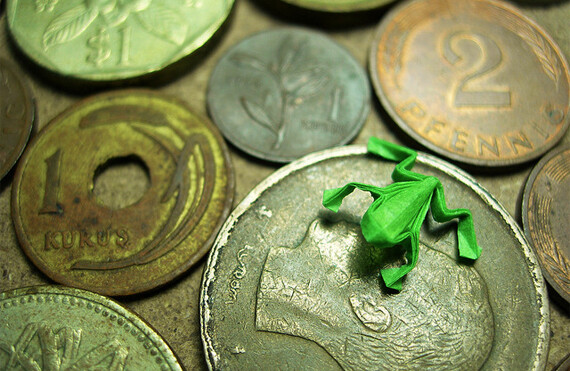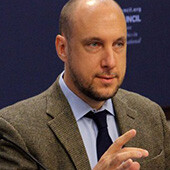I was scheduled to deliver a keynote speech next month to more than 1,000 business executives on the topic of whether ethical capitalism is possible. The event organizers, a Tokyo-based consultancy that specializes in corporate social responsibility, had the foresight to pose this question last fall. Ironically, the intervening events of the global economic downturn—caused by misguided incentives, greed, and moral lapses—forced the company to cancel the event.
For me, this recession has been defined by frustrating paradoxes. Easy money, overcapacity, and reckless consumption are what got us into this mess, yet governments must react by lowering interest rates and pushing through enormous fiscal stimulus packages with the hope that the housing, retail, and investment markets won't fall much more. Similarly, long-term sensible investments in clean energy and social welfare are hindered by falling oil prices, a lack of funding, and fresh anxiety about corporate bottom lines.
From these developments, one could conclude that the global economic system is inherently flawed, that it is unethical and doomed to destroy itself. In fact, what is critically needed is moderation, a middle ground between total freedom and principled action. The incoming Obama Administration calls it "smart policies." The alternative is protectionism, a rolling back of the open global economy, and political if not armed conflict.
Instilling the practice of ethical capitalism is possible and practical. Consumers increasingly demand products that coincide with their moral awareness. Likewise, politicians are under pressure to implement policies that mitigate the stresses of globalization. These forces can come together to produce products that are recycled, carbon neutral, free range, or fair trade, and policies that battle climate change, poverty, and global diseases.
Non-action is highly risky. Looking at climate change alone, the possible long-term risks include a shift in arable land; sharpening competition for energy resources; and the emergence of climate change refugees from island nations or low-lying areas, who may carry with them or engender political violence and unrest, even terrorism. Given that carbon emissions are primarily related to business activities, how can business models become more sustainable?
Global human civilization has all the moral tools it needs. As Peter David Pedersen of E-Square has noted, we neither have the time nor the need for another ideology or "ism." Ethical principles that emphasize reciprocal rights and responsibilities have long characterized human societies. The Golden Rule is a feature of more than 100 world religious and cultural canons—"Do unto others as you would have them do unto you."
The ancient Egyptians and Greeks alike pointed to the moral worth of not doing to your neighbor "what you would take ill from him." The Golden Rule is found in both the Old and the New Testament, with the Great Commandment found in Leviticus: "Love thy neighbor as thyself." For Islam, the Golden Rule was offered in the last sermon of Muhammad: "Hurt no one so that no one may hurt you."
Variations and extensions of the principle are also found in Buddhism, Hinduism, Taoism, and Jainism. For many of these Eastern faiths, the Golden Rule extends beyond one's fellow man to encompass all creatures, because sentience exists in a spectrum. The original interpretation of humankind's relationship with nature was that of stewardship, as outlined in the Old Testament and Hebrew Scriptures.
If the Golden Rule acts to codify one's rights and responsibilities toward others, the principle of the Golden Mean helps them to be achieved. As a key concept in Chinese, Greek, and Indian philosophy, the Golden Mean emphasizes tolerance, moderation, and pluralism. Aristotle's maxim "nothing in excess" and Confucius's idea of equilibrium speak to modern concepts of sustainable living.
In the 1980s, the Brundtland Commission presented sustainability as an integration of economic, social, and environmental spheres to meet the needs of the present without compromising the ability of future generations to meet their own needs. This is simply a special case of the Golden Rule: Do unto future generations as you would have them do unto you.
Encompassed in this definition are not only the traditional relations of sustainability to energy, natural resources, and emissions, but also a notion of sustainability that is extended to community relations, working conditions, and succession planning. If heeded, these basic ethical principles require individuals to consider the consequences of their actions, as they apply not only to their peers but also to their environments.
Today there are promising signs of a more ethically minded business culture. Many businesses are shifting away from narrow, profit-driven models to models with a greater focus on environmental and social issues. Corporate social responsibility, although not a new concept, is gaining currency in the mainstream marketplace, as governments, consumers, and shareholders demand better products and conduct from companies.
Corporate social responsibility and its financial counterpart socially responsible investing have risen substantially as a concern for global executives. These two fields, devoted to the creation of an ethical and sustainable business mode, encompass within them everything from funding local community projects to securing employee benefits in the workplace, reducing poverty, and preserving the health of the environment.
Part of the reason for this shift is that companies are being held to account by their constituents. The reach of the Internet has produced ready access to information and a new means of voicing objections and suggestions. With the ease of new technology and a more resolute brand of activism, stakeholders are better able to create open lines of communication to corporate management circles, forming the grassroots campaigns of the new millennia.
These concerns about redirecting capitalism toward the public good are perennial. In 1909, Herbert Croly, one of the founders of the New Republic, published The Promise of American Life. His book, which influenced Presidents Theodore Roosevelt, Woodrow Wilson, and Franklin Roosevelt, pointed to the need for a stronger central government to check greed, corruption, and unfair distribution of wealth.
In the interconnected global community of today, organizations and individuals are banding together across cultural and geographic divides to solve common problems. They are voicing the need for a renewed and moderate normative framework that will define the way humans live and interact in the 21st century.
In anticipation of the February event in Tokyo, I asked United Nations Special Representative John Ruggie whether ethical capitalism is possible. "Well, sure," he said with a grimace. But it won't occur unless policies and regulations provide the right incentives, he continued. The role of ethics is in shaping those regulatory regimes.
The Obama Administration has a big job ahead in reminding the American people of their ethical roots. During his inauguration speech this week, President Obama said that although we all face new challenges, core ethical principles, like honesty, loyalty, and fair play, are "old" and "true." Fortunately, and again paradoxically, the new president also knows that a crisis is not to be wasted.
Daniel Schuurman and Abigail Paris contributed to this essay, which is dedicated to the team at E-Square Inc.




